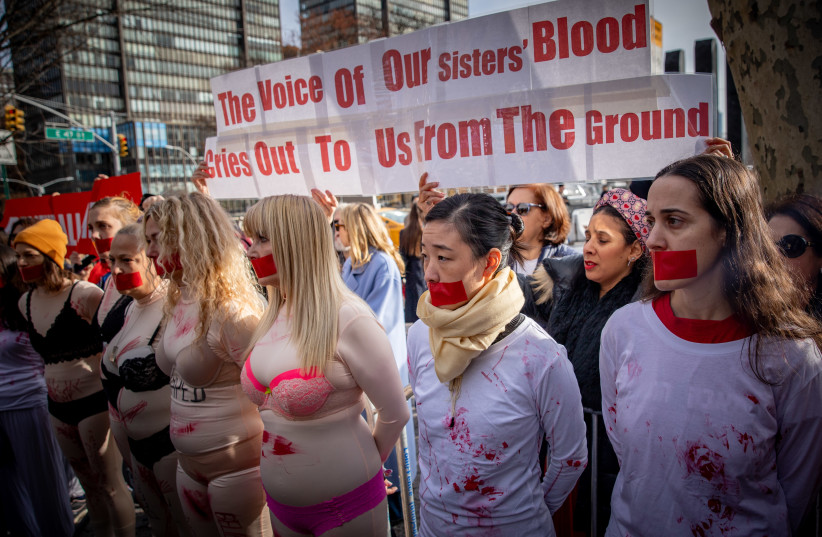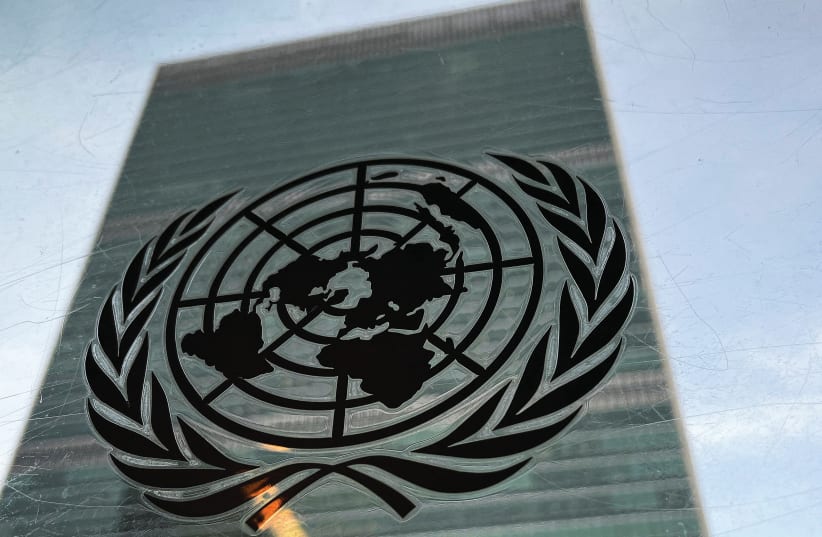The 69th United Nations Commission on the Status of Women has just concluded. Thousands of women from around the world convened at UN headquarters in New York to discuss ways to achieve equality, development, and peace for all women—a goal established 30 years ago in the Beijing Declaration and Platform for Action.
Initially, it was inspiring to witness the multicultural representation of women. Especially notable was the high percentage of young women and girl activists. A loud and clear call was made for the election of the first woman as the next UN secretary-general at this fall’s 80th session of the UN General Assembly.
But since that black day on October 7, 2023, UN Women has failed to show solidarity with the Israeli women who were viciously raped, mutilated, and murdered by both Gazan terrorists and civilians. It is the height of hypocrisy that, once again, during a conference dedicated to women’s rights—including the right not to be used as a weapon of war—UN Women failed to stand firmly with Jewish women still reeling from the silence that followed the atrocities committed against their Israeli sisters.
As a representative of the Simon Wiesenthal Center—a Jewish global activist NGO that fights antisemitism, teaches the lessons of the Holocaust, defends Israel, and promotes tolerance and peace—I had the pleasure of meeting many women who embrace those values. We cannot expect to agree on everything, but these women, including those from the Middle East, were open to respectful dialogue. Ukrainian and Myanmar women shared their common experiences with conflict-related sexual violence. Arab women from Lebanon, Bahrain, Egypt, and Israel spoke about expanding the Abraham Accords, the need for Holocaust education, and delivering messages of hope, coexistence, and collaboration across regions. Muslim women from communities in Great Britain, Canada, the Uyghur diaspora, and Myanmar held a conference on Islamophobia and welcomed the perspectives of Israeli and Jewish women.
The same cannot be said for the majority of the more than 500 women who attended the side event titled “State of Palestine, UN Women and the UN Economic and Social Commission for Western Asia (ESCWA).” Unlike every other session I attended, this one was filled with hostility and hate toward Israel and Jews.


As is typical of UN discussions on Israel since Hamas’s unprovoked attack on southern Israel on October 7, 2023—when 1,200 Israelis, mostly civilians, were butchered, raped, and burned alive, and another 250 were taken hostage—this fact was not even acknowledged. The idea that Israel, like any sovereign nation, has the right to protect its citizens was completely absent. The Palestinian narrative remained one of victimhood, denial, and total avoidance of responsibility.
The representative from Chile, a co-sponsor of the event, pledged her country’s support for the recovery of Palestinian women, who she said have shown unwavering resilience in the face of adversity. That’s fair enough, considering Chile is home to the largest Palestinian diaspora outside the Middle East.
Other panelists far less benign
Other panelists were far less benign. Dr. Amrita Kapur, the newly appointed head of the Women’s International League for Peace and Freedom, incorporated the language of intersectionality and Marxist ideology to promote anything but peace. A highly articulate international lawyer, Dr. Kapur incited an audience—many wearing overtly political garments in violation of conference rules—by hurling accusations against the Jewish state that might as well have been written by Hamas:
Occupation (Israel unilaterally withdrew from Gaza in 2005, leaving it under Palestinian governance.)
Colonialism (The British and French were the colonial powers who defeated the occupying Ottoman Empire and divided the region after World War I. Jews have been indigenous to the land of Israel for over 3,000 years.)
Denial of rights of Palestinian women and girls (Israeli citizens—Jewish and Arab alike—have equal rights. Hamas, not Israel, has governed Gaza since 2007.)
Oppressors (Hamas, not Israel, has oppressed Gazans, diverting billions of dollars to build an underground terror network rather than improving civilian life. Hamas built no bomb shelters for its people.)
Genocide (Hamas initiated this war by invading Israeli territory, and it routinely hides behind women and children by placing command centers in or near schools, mosques, and hospitals. Any innocent lives lost in the conflict are ultimately the result of Hamas’s actions, not Israel’s.)
Panelist Randa Siniora, a Palestinian human rights activist, declared that anyone who supports global rights must stand in solidarity with Palestinian women. She argued that all oppressed people must support the Palestinian women’s cause.
A Palestinian woman joined the conference by satellite from Gaza, parroting the Hamas narrative and accusing the “heinous Israeli occupation of trying to eliminate us in a war of genocide.”
What were these women advocating for? Certainly not for dialogue with their Israeli counterparts. Certainly not for holding Hamas accountable for starting this war. Certainly not for standing with Jewish women fighting against conflict-related sexual violence. And certainly not for the unconditional release of the hostages who have been starved and tortured in Gaza for over 500 days.
Their message was loud and clear: All women must stand in solidarity with Palestinian women against Israel and hold Israel accountable for “crimes against humanity.” Never mind Hamas’s own crimes and its repeated vows to carry out more October 7-style attacks until Israel is destroyed. Not one person in the room expressed any solidarity with the Israeli victims of October 7.
The meeting ended with a raucous chant of the pro-Hamas slogan “Free, Free Palestine, Free, Free Palestine”—code for the elimination of Israel. If the Trump administration were looking to identify pro-Hamas supporters, this meeting would have been a target-rich environment.
At this point, no one should be shocked. The UN still refuses to label Hamas a terrorist organization. Secretary-General António Guterres only seems to show emotion when Israel dares to fight back. His failure to unequivocally condemn Hamas for its crimes against humanity has given (im)moral cover to UN agencies and many NGOs to cast Israel as the criminal in the kangaroo courts of the International Criminal Court and International Court of Justice. Israeli women and men seeking justice and empathy for victims of the genocidal onslaught against their mothers, sisters, and daughters will have to look beyond civil society and the halls of diplomacy.
Dr. Deborah Soffen is a women’s and children’s advocate at the Simon Wiesenthal Center.
